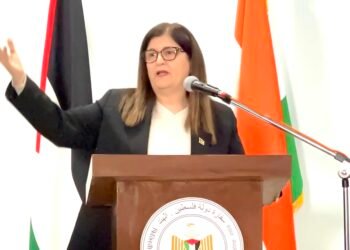KUALALUMPUR: U.S. President Donald Trump headlined the ASEAN Summit in Kuala Lumpur on Sunday, where diplomacy, trade, and regional reconciliation converged under Washington’s watchful mediation.
The event’s centerpiece came as the leaders of Thailand and Cambodia signed an expanded ceasefire deal an agreement personally overseen by President Trump, who arrived in Malaysia for summit talks and pivotal trade meetings on the sidelines.
Thai Prime Minister Anutin Charnvirakul and Cambodian counterpart Hun Manet signed the deal during a ceremony bearing the emblem “Delivering Peace,” reaffirming and expanding a truce first reached three months earlier.
“This declaration, if fully implemented, will provide the building blocks for a lasting peace, but more importantly, it will begin the process of mending our ties,” Hun Manet said. “Our border communities have been divided by conflict, and innocent civilians have suffered immense losses.”
Trump’s intervention had been critical in halting the five-day border conflict in July, when he called the then-leaders of both nations, urging them to end hostilities or risk their trade negotiations with Washington being suspended.
“The United States will have a robust commerce and cooperation, transactions, lots of them, with both nations, as long as they live in peace,” Trump declared, signaling America’s growing role as both peacemaker and partner in Southeast Asia.
The skirmish between Thailand and Cambodia had led to the deadliest fighting in recent history between the neighbors, with at least 48 people killed and some 300,000 temporarily displaced amid exchanges of heavy artillery and rocket fire.
Prime Minister Anutin, who nearly missed the ceremony following the death of Thailand’s Queen Mother Sirikit on Friday, said both sides would withdraw “heavy weapons from the border areas to ensure the safety of our people” and that Thailand would release 18 detained Cambodian soldiers.
In Kuala Lumpur, President Trump received a vibrant welcome from Malaysian Prime Minister Anwar Ibrahim and a troupe of ceremonial dancers at the airport. The President paused for a light moment dancing briefly with performers, waving both U.S. and Malaysian flags before heading into the city for a full day of diplomatic and trade engagements.
While Trump mingled with ASEAN leaders, U.S. and Chinese negotiators met on the sidelines to further de-escalate tensions in their ongoing trade dispute. Top U.S. trade negotiator Jamieson Greer confirmed that Saturday’s talks covered a “broad range of topics,” including the possible extension of the truce on trade measures.
“I think that we’re getting to a spot where the leaders will have a very productive meeting,” Greer said.
Rare earth minerals dominated many of the private discussions. China’s grip on global rare earth supplies has pushed Washington to intensify efforts to diversify supply chains. At the ceasefire ceremony, Trump announced that the U.S. would soon finalize critical minerals agreements with Thailand and Malaysia while working toward a broader trade deal with Cambodia.
Later in the day, Trump is scheduled to meet Brazilian President Luiz Inácio Lula da Silva to address sharp U.S. tariffs on Brazilian exports. Lula has argued that the 50% tariffs introduced by Washington were a “mistake,” pointing to a $410 billion U.S. trade surplus with Brazil over the past fifteen years. Trump signaled before the trip that he remained “open” to lowering the tariffs.
Conversely, relations with Canada remain strained. A planned meeting with Canadian Prime Minister Mark Carney was canceled after trade talks between the two nations collapsed. Trump announced a further 10% tariff hike on Canadian goods, “above what they’re paying now.”
Amid these headline developments, ASEAN leaders celebrated a moment of regional significance as East Timor officially became the bloc’s eleventh member state.
The young democracy of 1.4 million people, also known as Timor-Leste, now joins a $3.8 trillion ASEAN economy its own modest $2 billion GDP underscoring both the scale of the challenge and potential ahead.
East Timor’s accession concluded a 14-year wait, marking a deeply symbolic victory for President Jose Ramos-Horta and Prime Minister Xanana Gusmao, the architects of the nation’s independence.
“For the people of Timor-Leste, this is not only a dream realised, but a powerful affirmation of our journey,” Gusmao announced. “Our accession is a testament to the spirit of our people, a young democracy, born from our struggle.”
As the ASEAN Summit unfolded, the convergence of ceasefire diplomacy, expanding trade frameworks, and widening regional membership framed a powerful tableau of renewal across Southeast Asia one where Washington again cast itself as both guarantor of stability and driver of economic integration.
• ⁃ Dr. Shahid Siddiqui | Follow on X @shahidsiddiqui


















Can you be more specific about the content of your article? After reading it, I still have some doubts. Hope you can help me.